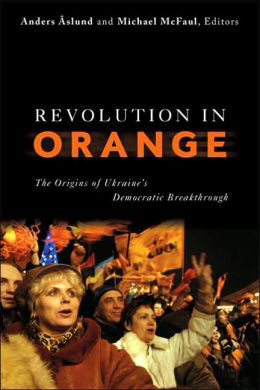Source: Washington
 The dramatic series of protests and political events that unfolded in Ukraine in the fall of 2004—the “Orange Revolution”—were seminal both for Ukrainian history and the history of democratization. When poisoned with dioxin, pro-Western presidential candidate Viktor Yushchenko was left physically weakened and disfigured but politically energized. The ruling party, faced with strengthened opposition, resorted to voter intimidation and massive electoral fraud to win the runoff election. Supporters of Yushchenko gathered in Kyiv, responding with mass demonstrations, sit-ins, and marches. Thanks in large part to this peaceful revolution, the flawed election results were annulled. In a second runoff, Yushchenko was elected as the new president. Revolution in Orange seeks to explain why and how this nationwide protest movement occurred. Its effects have already been felt from Kyrgyzstan to Lebanon and are likely to travel even further. Yet few predicted or anticipated such a dramatic democratic breakthrough in Ukraine.
The dramatic series of protests and political events that unfolded in Ukraine in the fall of 2004—the “Orange Revolution”—were seminal both for Ukrainian history and the history of democratization. When poisoned with dioxin, pro-Western presidential candidate Viktor Yushchenko was left physically weakened and disfigured but politically energized. The ruling party, faced with strengthened opposition, resorted to voter intimidation and massive electoral fraud to win the runoff election. Supporters of Yushchenko gathered in Kyiv, responding with mass demonstrations, sit-ins, and marches. Thanks in large part to this peaceful revolution, the flawed election results were annulled. In a second runoff, Yushchenko was elected as the new president. Revolution in Orange seeks to explain why and how this nationwide protest movement occurred. Its effects have already been felt from Kyrgyzstan to Lebanon and are likely to travel even further. Yet few predicted or anticipated such a dramatic democratic breakthrough in Ukraine.
This volume attempts to distinguish between necessary and facilitating factors in the success of the Orange Revolution. It also discusses the elements that have been commonly assumed to be critical, but in fact were not instrumental in the movement. Chapters explore the role of former president Kuchma and the oligarchs, societal attitudes, the role of the political opposition and civil society, the importance of the media, and the roles of Russia and the West.
Advance Praise
"Keen observers of the recent transition, Aslund and his coauthors write with authority about the challenges and opportunities Ukraine faces today.... This book should be read carefully by students and policy makers alike."
—George Soros, chairman of the Open Society Institute




.jpg)
